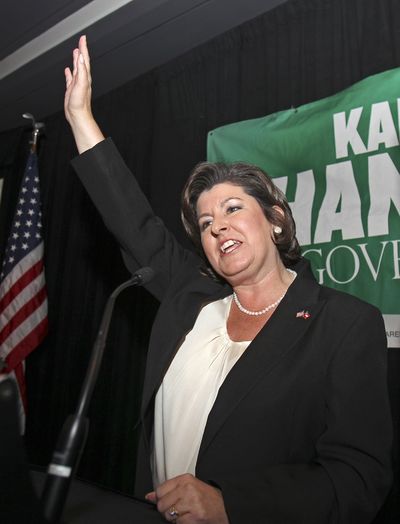Komen charity responds as uproar over cuts widens
Leaders insist decision wasn’t politically motivated

NEW YORK – The renowned breast cancer charity Susan G. Komen for the Cure faced an escalating backlash Thursday over its decision to cut breast screening grants to Planned Parenthood. Some of Komen’s local affiliates are openly upset, including all seven in California, and at least one top official has quit, reportedly in protest.
Meanwhile, Komen has been deluged with negative emails and Facebook postings, accusing it of knuckling under to pressure from anti-abortion groups, since the Associated Press reported earlier this week that it was halting grants that Planned Parenthood affiliates used for breast exams and related services. The grants totaled $680,000 last year.
Planned Parenthood has been heartened by an outpouring of support in response to the cutoff. Besides $400,000 in smaller donations from 6,000 people, it is receiving $250,000 from a family foundation in Dallas and a $250,000 pledge announced Thursday by New York Mayor Michael Bloomberg to match future donations.
In Washington, 26 U.S. senators – all Democrats except for independent Bernie Sanders, of Vermont – signed a letter calling on Komen to reconsider its decision.
“It would be tragic if any woman – let alone thousands of women – lost access to these potentially lifesaving screenings because of a politically motivated attack,” the senators wrote.
Komen’s top leaders, in their first news conference since the controversy erupted, denied Planned Parenthood’s assertion that the decision was driven by pressure from anti-abortion groups.
“We don’t base our funding decisions … on whether one side or the other will be pleased,” said Komen’s founder and CEO, Nancy Brinker, depicting the criticism as a mischaracterization of the charity’s goals and mission.
Komen has said the decision stemmed from newly adopted criteria barring grants to organizations under investigation – affecting Planned Parenthood because of an inquiry by a Republican congressman acting with encouragement from anti-abortion activists.
Brinker said Thursday that there were additional factors, notably changes in the types of breast-health service providers it wanted to support. However, she said, grants would continue this year to three of the 19 Planned Parenthood affiliates – in Denver, California’s Orange County, and Waco, Texas – because they served clientele with few other breast-screening options.
A source with direct knowledge of decision-making at Komen’s headquarters in Dallas gave a different account, saying the grant-making criteria were adopted with the deliberate intention of targeting Planned Parenthood. The criteria’s impact on Planned Parenthood and its status as the focus of government investigations were highlighted in a memo distributed to Komen affiliates in December.
According to the source, who spoke on condition of anonymity for fear of repercussions, a driving force behind the move was Karen Handel, who was hired by Komen last year as vice president for public policy after losing a campaign for governor in Georgia in which she stressed her anti-abortion views and frequently denounced Planned Parenthood.
Brinker, in an interview with MSNBC, said Handel didn’t have a significant role in the policy change.
The source also said that Mollie Williams, who had been Komen’s director of community health programs, had resigned in protest over the grant cutoff.
Williams, in an email, said she could not comment on her departure for reasons of professional confidentiality, but she was clear about her views.
“I have dedicated my career to fighting for the rights of the marginalized and underserved,” she wrote. “And I believe it would be a mistake for any organization to bow to political pressure and compromise its mission.”
Williams said she was saddened by the rift because she admired both Komen and Planned Parenthood.
Among Komen’s affiliates, there were clear signs of discomfort with the decision. The Connecticut branch received scores of supportive emails after expressing frustration about the cutoffs and good will toward Planned Parenthood.
All seven Komen affiliates in California, in a joint letter to their congressional delegation, said they were “strongly opposed” to the policy change and were working to overturn it.
“Our commitment to our mission is unwavering,” the letter said. “This is a misstep in that journey and … we will do whatever it takes to do what is right for the health of women and men in California.”
In New York City, a member of the Komen affiliate’s medical advisory board said she would resign if the decision wasn’t changed soon.
“Komen is a wonderful organization and does tremendous things for women, but this is straying from their mission,” said Dr. Kathy Plesser, a radiologist. “It’s sad.”
The board of the Arkansas affiliate issued a statement noting that the decision was made at Komen headquarters “without input from affiliates,” and called for the new policy to be changed.
“We hope Komen national will reverse its position on granting to organizations under investigation because we feel decisions of this nature should be made only after the investigation is complete,” the statement said.
The American Association of University Women, in protest over Komen’s decision, said it was scrapping plans to offer a Komen Race for the Cure as one of the activities at its upcoming National Conference for College Women Student Leaders.
According to Planned Parenthood, its health centers performed more than 4 million breast exams over the past five years, including nearly 170,000 as a result of Komen grants.
Though comments posted on Komen’s Facebook page seemed to be mostly critical of the grant decision, Brinker said at her news conference that donations to the charity had increased since Tuesday.
She also said there were other organizations receiving Komen grants, in addition to Planned Parenthood, that might be adversely affected by the new criteria about investigations, but she did not identify them.